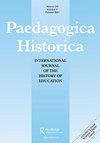阿根廷的健康、疾病和学校:历史上不断变化的关系中的流行病标志
IF 0.3
4区 教育学
Q4 EDUCATION & EDUCATIONAL RESEARCH
引用次数: 0
摘要
本文从历史的角度讨论了健康、疾病和教育之间的联系,旨在为理解这些关系提供线索,这些关系在最近的全球事件中得到了证明,不能单独分析。几个世纪以来,社会总能找到不同的方式来教育新一代和处理他们的健康问题。教育与疾病之间的关系在历史上各不相同,但在某些极端情况下,如流行病,这种关系会加强并变得更加明显。每一种特殊情况都以不同的方式影响着教育制度和学校机构,因为它改变了教师、学生及其家庭的生活,代表了教学方面的挑战,并在不同程度上给他们所有人都打上了烙印,并对他们的未来产生了影响。本报告的重点是自现代教育制度建立以来直到最近在阿根廷发生的疫情期间发生的某些事件在教育中留下的印记。这类事件是现代化进程中1870年至1920年的一连串“瘟疫”(如1871年的“黄热病”和1918年的“西班牙流感”),以及1956年庇隆主义和反庇隆主义政治斗争期间的“小儿麻痹症爆发”。在这两种情况下,我们将尝试a)重建社会和学校机构经历这些流行病的方式,b)分析健康和教育之间密切而不断变化的联系,这使学校成为一个特权空间,这种联系得到加强,c)呈现教学方面的后果。本文章由计算机程序翻译,如有差异,请以英文原文为准。
Health, illness, and schools in Argentina: marks of epidemics in the history of a changing relation
ABSTRACT This article discusses the connections between health, illness and education from a historical perspective, aiming at providing clues for understanding these relationships that, as demonstrated in recent global events, cannot be analyzed separately. Over the centuries, societies have always found different ways of educating their new generations and deal with their health problems. The relationship between education and illness has varied throughout history, but in certain extreme cases, such as epidemics, this relationship intensifies and becomes more evident. Each particular situation affected the educational system and the school institutions in different ways, as it changed the life of teachers, pupils and their families, represented pedagogical challenges, and marked all of them at different levels and had an impact on their futures.This focuses on the marks left in education by certain events that took place during the epidemic since the foundation of the modern educational system until more recent times in Argentina. Such events are the succession of “plagues” from 1870 to 1920 (as the “Yellow Fever” in 1871 and the “Spanish Flu” in 1918) during the modernization processes, as well as the “Poliomyelitis Outbreak” in 1956 during the political struggle between Peronism and anti-Peronism. In both cases, we will try to a) reconstruct the ways in which society and specially school institutions went through these epidemics, b) analyze the close and changing bonds between health and education, which turned the school into a privileged space where that bond was enhanced, and c) present the consequences regarding instruction.
求助全文
通过发布文献求助,成功后即可免费获取论文全文。
去求助
来源期刊

PAEDAGOGICA HISTORICA
Multiple-
CiteScore
0.90
自引率
40.00%
发文量
72
期刊介绍:
"Paedagogica Historica is undoubtedly the leading journal in the field. In contrast to a series of national journals for the history of education, Paedagogica Historica is the most international one." A trilingual journal with European roots, Paedagogica Historica discusses global education issues from an historical perspective. Topics include: •Childhood and Youth •Comparative and International Education •Cultural and social policy •Curriculum •Education reform •Historiography •Schooling •Teachers •Textbooks •Theory and Methodology •The urban and rural school environment •Women and gender issues in Education
 求助内容:
求助内容: 应助结果提醒方式:
应助结果提醒方式:


